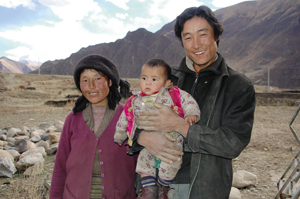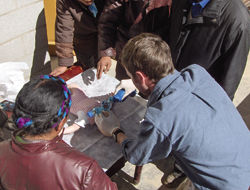The holidays are coming. Time to draw up your gift list. Forget cashmere lap robes, chronometer watches, that scented candle your assistant will only re-gift to her grandmother. Expensive, unimaginative presents are so last year. The Buddhist spirit of giving—dana—is about generosity, not booty. We need to think outside the Tiffany box.
Conscious consuming today means not just buying less but being mindful of your footprint on the earth. “Green” etiquette says the best present is one that doesn’t pollute, doesn’t exploit resources, causes no harm, helps someone in need—and may even burnish your karma. When you plunk down your credit card, make it truly count.
“The spirit of a gift is kept alive by its constant donation,” writes Lewis Hyde in The Gift. “Indian giver,” he explains, originally meant someone who “understood a cardinal property of the gift: whatever we have been given is supposed to be given away again, not kept. Or, if it is kept, something of similar value should move on in its stead, the way a billiard ball may stop when it sends another scurrying across the felt.”
Gift-giving, then, is a basic lesson in detachment as well as an exercise in metta—lovingkindness. Irrespective of the gift, the act of giving expresses good will.
Related: Dana: The Practice of Giving
Increasingly, conscious giving also involves karuna—compassion—in the form of a cash gift to a worthy cause: not the check just written to offset a hefty year-end bonus but a donation made in the name of a friend, family member, or client. Birthdays, holidays, anniversaries, weddings—any occasion that warrants a gift is an opportunity for compassionate giving. Conscious brides—some of them, no doubt, on marriage two, three, or four—are registering online for donations to a favorite cause, in lieu of silver gravy boats, china services, and Waring blenders. Even children are asking birthday party guests to make donations instead of bearing gifts. (It’s debatable whether the kids or the parents are sparking this trend, but the result is to be applauded. It’s never too soon to learn generosity.)

Donations are starting to replace the goody bags given out as party favors. For their October 2007 wedding, Mike Dupee and Carmen Negrón-Colón decided to forego the predictable photo-in-a-frame and give each of their 300 guests a “gift of safe birth”—a donation to One Heart Worldwide, an organization that is helping reverse Tibet’s infant and maternal mortality rate, in part by distributing a kit containing a sterile glove, disposable towels, baby blankets, medication, and other birthing essentials. Like many people opting for gifts of service, Dupee—an investment banker turned vice president for corporate social responsibility at Green Mountain Coffee Roasters in Vermont—says he’s “fed up with consumer culture and having more things to clutter up our lives.” A student of Shinzen Young, Dupee thinks of the gift as an extension of his practice and an expression of interconnectedness. “A wedding is about two people coming together before friends and family to create a new family, and to connect that to people in Tibet who have so much less seems remarkably appropriate.”
Founded by Arlene Samen, an American nurse-practitioner and longtime practitioner in the Tibetan Buddhist and Zen traditions, One Heart Worldwide is one of the carefully selected “Gifts of Compassion” offered by ABC Home in New York City. An upscale emporium known as much for its social commitment as its luxe goods, ABC Home created MISSIONMarket to give its customers a chance, with the click of a mouse, to support a visionary organization that promotes healing of self, family, community, or the planet—and fosters a sense of home. This year, you can pick from among such causes as an after-school program run by the Greyston Foundation, a community development organization in Yonkers founded 25 years ago by Roshi Bernie Glassman; the grassroots activism of ForestEthics, dedicated to protecting Canada’s wilderness and old-growth forest—and convincing major corporations and catalog companies to use recycled paper; and the homey apartments set up by the Patrick Chege Memorial Orphanage in Kenya to shelter children orphaned by AIDS. The person you are honoring with a Gift of Compassion receives a handmade silk bag that contains a card describing the program that will benefit from your donation.

Now in its fourth year, MISSIONMarket marries beauty and good works, according to Amy Chender, ABC Home’s vice president of environmental and social responsibility, and a Tibetan Buddhist practitioner in the Shambhala tradition. “People often don’t know the cutting-edge organizations out in the field,” Chender points out. “MISSIONMarket provides guidance about giving compassionately.”
Paulette Cole, ABC Home’s CEO and creative director, was inspired to create these giving opportunities in part by the work of the Seva Foundation. Co-founded in the late 1970s by Ram Dass to treat blindness in the Himalayas, Seva (a Sanskrit term referring to selfless service) now supports programs in poor communities around the globe. Its online catalog describes a range of “Heart of Compassion” and “Kindness for Children” gifts.

Seva is just one of a number of nonprofits with an online gift catalog. From the Heifer Project—an organization fighting hunger and poverty worldwide by supplying livestock and training to families in need—you can “buy” a box of chicks, say, or some rabbits, or a cow or llama. Instead of taking delivery on the livestock, your friend receives a gift card describing how the donation will be used. At Oxfam America, donor dollars go toward relieving poverty and injustice in some 26 countries. Their program, Oxfam America Unwrapped, offers gifts symbolic of their work, such as a can of worms, a crocodile, an emergency toilet.
The Internet has made gift donations a breeze. In addition to nonprofits that fund their own projects, there are portals like JustGive.org and ChangingThePresent.org that channel donations to hundreds of organizations and will match donors with causes that speak to their values. Both offer a gift registry and gift certificates.
If gift-giving is a form of exchange, a gift of compassion is “the gift that gives three times,” as Amy Chender puts it. You, the donor, get the satisfaction of supporting your favorite cause, plus a tax deduction and credit for thinking of your friend. The end user—the organization you’re supporting—receives funds for its programming. The “recipient”—the person you’re honoring with your donation—gets a gift card (and in ABC’s case, a silk bag) and the good feeling that for someone, somewhere, life is about to get a little better.
Though the overriding appeal of gift donations is humanitarian, they’re also practical. “When we think about gift-giving it seems very complicated—picking out a present and buying it,” says Mike Dupee. “This is very simple.” For corporate gifts, it’s ideal. As an investment banker, Dupee received countless gifts from vendors—calendars, pens, and the like. “But one vendor sent me a paper saying he’d made a $25 donation to the Heart Association in my name. Fifteen years later, I still remember that.”
Gift-giving forges a bond between giver and receiver. ABC designed Gifts of Compassion with that personal connection in mind. “The disparity of wealth in the world is so unjust,” says Cole. “We hope for people to have the feeling they can share their good fortune. There is gratitude in creating balance between the privileged and the underprivileged.”
A survey by Kintera, a company that supplies software to nonprofits, found that more than three-quarters of the respondents would prefer receiving a charitable donation in their name to a traditional holiday gift. Still, giving on another’s behalf can be tricky. To make sure your gift will be met with joy, etiquette experts recommend picking a cause that reflects the recipient’s interests, not yours. If Uncle Fred is a logger, he may not appreciate efforts to protect caribou habitat. On the other hand, if he’s a union organizer, he may be thrilled to bits to think he’s helping staff a workers’ rights center.
What does all this mean to a Buddhist? How does gift-giving provide an opportunity for practice? For one thing, a gift donation has low environmental impact and high social value. For another, compassionate giving is a way of acknowledging our responsibility for one another and the earth. “Ask yourself, ‘What is my intention with this gift?’” suggests psychotherapist Sandra Weinberg, CSW, a co-founder of New York Insight Meditation Center. “The Buddha spoke of skillful means. Is your gift-giving selfish, motivated by ego-building or a tax deduction or your own interests, or is it selfless—thinking of the other person?”
True dana is about giving with no expectation of return. One who receives a gift of compassion is promised nothing more than the emotional boost of knowing good has been done. But as we groan under the weight of our possessions, that in itself can be a priceless gift. Altruism is a proven tonic.
Years ago, whenever anyone asked my father what he wanted for his birthday or Christmas, he invariably replied, “Peace and quiet.” In our supercharged, overconsuming lives, that may be the most compassionate gift of all.
Contributing editor Joan Duncan Oliver is the author, most recently, of Coffee with the Buddha.
Compassionate Giving Online
abchomeandplanet.org: ABC Home’s Gifts of Compassion
alternativegifts.org: gifts of service, gift registry for 34 nonprofits
changingthepresent.org: gifts of service, gift registry, wish lists
charitynavigator.org: rates nonprofits on how they use donor dollars
guidestar.org: rates 1.7 million nonprofits, with tips on giving wisely
justgive.org: gift certificates, gift baskets, gift registry, wish lists
heifer.org: Heifer Project’s online catalog with gifts, wish lists, wedding registry
oxfamgifts.com: Oxfam America’s online gift catalog
seva.org: Seva Foundation’s Gifts of Service
directrelief.org: tribute cards, gifts of service
Thank you for subscribing to Tricycle! As a nonprofit, we depend on readers like you to keep Buddhist teachings and practices widely available.
